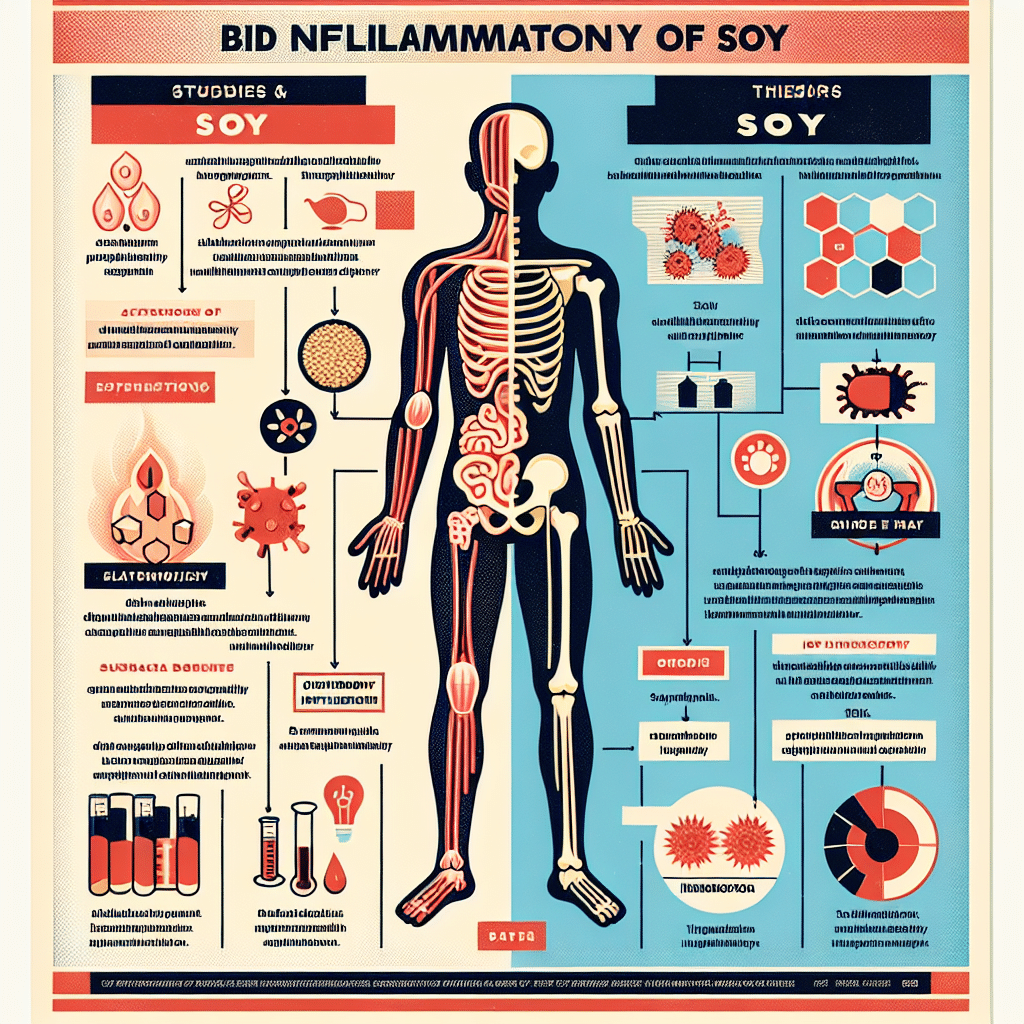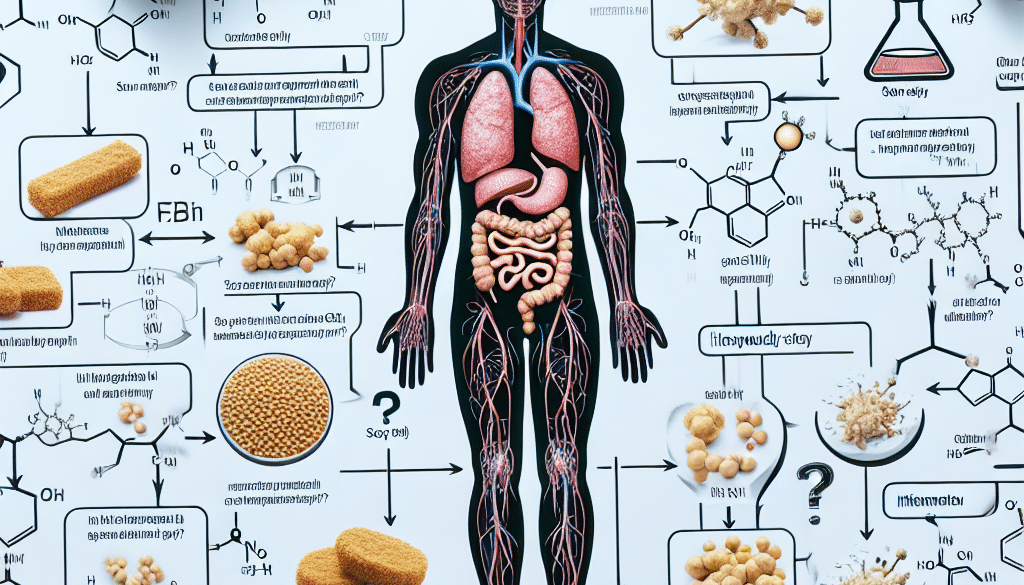Does Soy Cause Inflammation?
-
Table of Contents
- Soy and Inflammation: Unraveling the Truth
- Understanding Inflammation
- The Nutritional Profile of Soy
- Soy Isoflavones and Inflammation
- Research on Soy and Inflammation
- Case Studies and Population Research
- Considerations and Recommendations
- Conclusion: The Verdict on Soy and Inflammation
- Discover ETprotein’s Premium Protein Products
Soy and Inflammation: Unraveling the Truth

In recent years, soy has become a staple in many diets around the world, lauded for its versatility and health benefits. However, it has also been the subject of controversy, with some claiming that soy can cause inflammation, potentially leading to various health issues. This article delves into the scientific evidence to answer the question: Does soy cause inflammation?
Understanding Inflammation
Inflammation is the body’s natural response to protect itself against harm. There are two types of inflammation: acute and chronic. Acute inflammation is the immediate response to an injury or infection, which is essential for healing. Chronic inflammation, on the other hand, is a prolonged inflammatory response that can contribute to a host of diseases, including heart disease, diabetes, and cancer.
The Nutritional Profile of Soy
Soy is a legume that has been consumed for centuries, particularly in Asian countries. It is a complete protein source, containing all nine essential amino acids. Soy is also rich in fiber, vitamins, and minerals, and contains bioactive compounds such as isoflavones, which have been studied for their potential health benefits.
Soy Isoflavones and Inflammation
Isoflavones, a class of phytoestrogens found in soy, have been the focus of research regarding inflammation. These compounds can mimic or modulate the action of estrogen in the body, leading to both interest and concern over their effects.
- Anti-inflammatory Properties: Some studies suggest that isoflavones have anti-inflammatory properties. For example, a study published in the Journal of Inflammation found that soy isoflavones reduced inflammation markers in postmenopausal women.
- Estrogenic Effects: The estrogen-like effects of isoflavones may also play a role in reducing inflammation, as estrogen has been shown to have a protective, anti-inflammatory effect on the cardiovascular system.
Research on Soy and Inflammation
Several studies have investigated the relationship between soy consumption and inflammation, with varying results:
- A meta-analysis in the European Journal of Clinical Nutrition concluded that soy protein significantly decreases serum concentrations of CRP (C-reactive protein) and IL-6 (interleukin-6), both markers of inflammation.
- Another study in the Journal of the American College of Nutrition found that soy intake was associated with lower levels of inflammatory markers in overweight women.
- Conversely, some research has suggested that soy can have pro-inflammatory effects in certain individuals, particularly those with soy allergies or intolerances.
Case Studies and Population Research
Observational studies in populations that consume high amounts of soy, such as in Japan and China, show lower rates of inflammatory diseases. These findings support the idea that soy may have an anti-inflammatory effect.
Considerations and Recommendations
When considering the effects of soy on inflammation, it is important to take into account factors such as:
- The form of soy consumed (whole soybeans, processed soy products, soy protein isolates, etc.)
- Individual differences in metabolism and gut microbiota
- The overall dietary pattern and lifestyle
Experts generally agree that whole soy foods, like tofu, edamame, and tempeh, can be a healthy part of a balanced diet. However, highly processed soy products may not provide the same health benefits and should be consumed in moderation.
Conclusion: The Verdict on Soy and Inflammation
The preponderance of scientific evidence suggests that soy does not cause inflammation in most individuals and may even have anti-inflammatory effects. However, as with any food, individual responses can vary, and those with soy allergies or intolerances should avoid it. For the general population, incorporating whole soy foods into a balanced diet can be a healthful choice.
Discover ETprotein’s Premium Protein Products
If you’re looking to enhance your diet with high-quality protein sources, consider ETprotein’s range of organic bulk vegan proteins. Their products, including organic rice protein, pea protein, and various seed proteins, are non-GMO, allergen-free, and boast a neutral taste. ETprotein also offers L-(+)-Ergothioneine (EGT) in various grades suitable for nutraceutical, pharmaceutical, and cosmetic applications.
Whether you’re a distributor, trader, or manufacturer in the food and beverage or health and wellness industries, ETprotein can meet your protein needs with their extensive product range. Trust in their expertise to provide you with the finest protein products on the market.
For more information or to sample their products, please contact ETprotein and email sales(at)ETprotein.com today.
About ETprotein:
ETprotein, a reputable protein and L-(+)-Ergothioneine (EGT) Chinese factory manufacturer and supplier, is renowned for producing, stocking, exporting, and delivering the highest quality organic bulk vegan proteins and L-(+)-Ergothioneine. They include Organic rice protein, clear rice protein, pea protein, clear pea protein, watermelon seed protein, pumpkin seed protein, sunflower seed protein, mung bean protein, peanut protein, and L-(+)-Ergothioneine EGT Pharmaceutical grade, L-(+)-Ergothioneine EGT food grade, L-(+)-Ergothioneine EGT cosmetic grade, L-(+)-Ergothioneine EGT reference grade and L-(+)-Ergothioneine EGT standard. Their offerings, characterized by a neutral taste, non-GMO, allergen-free attributes, with L-(+)-Ergothioneine purity over 98%, 99%, cater to a diverse range of industries. They serve nutraceutical, pharmaceutical, cosmeceutical, veterinary, as well as food and beverage finished product distributors, traders, and manufacturers across Europe, USA, Canada, Australia, Thailand, Japan, Korea, Brazil, and Chile, among others.
ETprotein specialization includes exporting and delivering tailor-made protein powder and finished nutritional supplements. Their extensive product range covers sectors like Food and Beverage, Sports Nutrition, Weight Management, Dietary Supplements, Health and Wellness Products, and Infant Formula, ensuring comprehensive solutions to meet all your protein needs.
As a trusted company by leading global food and beverage brands and Fortune 500 companies, ETprotein reinforces China’s reputation in the global arena. For more information or to sample their products, please contact them and email sales(at)ETprotein.com today.












